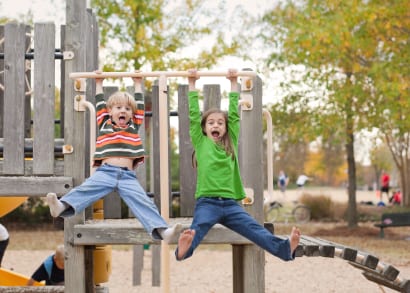When you’re little, play is one of those perfect things – a renewable resource of fun times, cut short only by sunlight and school. Just imagine if broccoli tasted good and chores were fun, and your daily chore was to eat broccoli. Just ask anyone, “Do you wish you had played less when you were a kid?”
I think we all know the answer to that.
But as we age, play seems less important and we forget how much it meant to us when we were young. Parents need to remember how awesome it is to play. Not only did it help make you into the healthy, happy, well-rounded person you are today – according to the American Academy of Pediatrics (AAP), play promotes the use of your child’s imagination as well as his physical, cognitive and emotional strength.
Learning Benefits
Even from a young age, your child learns new skills – like problem-solving and conflict-resolution skills – while playing. For example, young children develop problem-solving skills as they solve a puzzle by testing where the pieces go. They learn how a dump truck works by manipulating its pieces.
For older children who are learning to play in groups, they learn conflict resolution skills as they communicate their likes and dislikes. Even as your child plays alone, he’s learning. He may learn about symbolism when he plays imaginary games or learn about colors, numbers and animals as he explores the world! Play activities engage your child, unlike TV and video games, which serve only to entertain, In fact, the AAP says TV can “have more.. potential negative effects than positive.”
Social Benefits
As your child engages in play activities with you or other children, she is honing her social skills. Play encourages cooperation, negotiation, taking turns and following the rules, according to the University of California (UC) Davis Cancer Center and the UC Davis Children’s Hospital. Children also develop their language skills through play. Even when you play Peek-a-Boo, she’s developing her social and language skills. See how he responds by smiling, laughing and mimicking your noises!
Emotional Benefits
When your child plays, he or she reaps several emotional benefits. In addition to gaining self-confidence and self-esteem, playing can help your child express feelings, according to the National Center on Physical Activity and Disability. Play can also reduce stress and depression in your child since it provides an avenue for enjoyment and fun. Play activities promote laughter and humor, both which make for effective coping skills and relaxation methods for children.
Another thing to consider is how much unstructured playtime your kids are getting. Parents who don’t let their children play without adult interference aren’t doing them any favors. Studies have shown that too much hovering from parents can have negative consequences such as anxiety, depression, narcissism and feelings of helplessness. Without play, your child’s growth will suffer.
As it turns out the old rhyme is true – “All work and no play makes Jack socially awkward.”
Want to learn more about the importance of play? Check out a podcast of our live chat with Mattel and the experts from Playworks:






